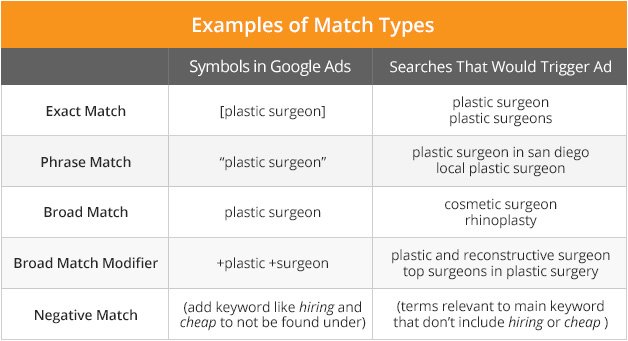
Keyword match types in Google Ads help control how closely the search query must match your keywords for your ad to be triggered. There are four main keyword match types:
Broad Match:
- Ads may show on searches that include misspellings, synonyms, related searches, and other variations. It provides the broadest reach but may result in less targeted traffic.
Example: If your broad match keyword is “running shoes,” your ad might appear for searches like “athletic footwear” or “jogging sneakers.”
Modified Broad Match:
- Similar to broad match but with more control. Specify certain keywords that must be present in the user’s query by adding a “+” sign before the keywords. Other words can still be present, but the modified broad match ensures certain words are included.
Example: If your modified broad match keyword is “+running +shoes,” your ad might appear for searches like “best running shoes” or “running shoes for women.”
Phrase Match:
- Ads appear on searches that include the exact phrase or close variations of the exact phrase. This provides a more targeted reach compared to broad match.
Example: If your phrase match keyword is “running shoes,” your ad might appear for searches like “buy running shoes” or “best running shoes for beginners.”
Exact Match:
- Ads appear only on searches that match the exact keyword or a close variant. This provides the most precise targeting but may limit the reach.
Example: If your exact match keyword is [running shoes], your ad might appear only for searches that exactly match “running shoes” with no additional words or variations.
By using a combination of these keyword match types, advertisers can control the specificity and reach of their ads, ensuring they reach the right audience while minimizing irrelevant clicks. It’s important to regularly review and adjust your keyword match types based on performance and evolving business goals.
